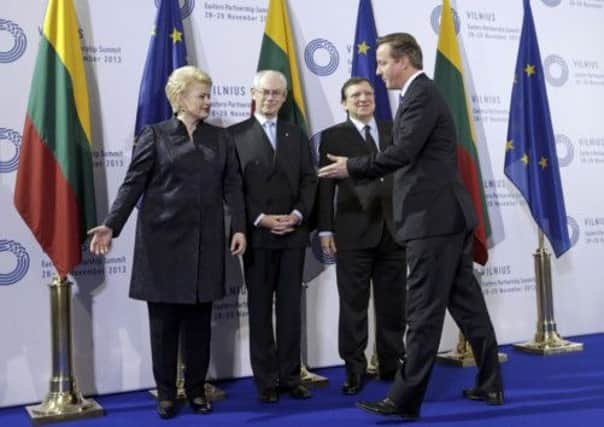In-out EU referendum bill wins backing in Commons


Pointedly, Prime Minister David Cameron was not in the House for the debate, as he was attending the EU Eastern Partnership summit in the Lithuanian capital, Vilnius.
In the Commons, Tory MP James Wharton said he was “relieved” the European Union (Referendum) Bill – a private member’s bill – would now go to the Lords after its third reading.
Advertisement
Hide AdAdvertisement
Hide AdMr Wharton said he has an unnamed sponsor lined up to launch the bill in the Lords.
He said of the Commons’ debate: “This is significant and I think it could be argued to be a historic thing … the House of Commons has voted overwhelmingly to pass at every stage legislation for a referendum. That has not been done since the last referendum in 1975.”
Labour decided not to force a vote on the third reading, a move Mr Wharton claimed suggested Ed Miliband saw the need for an in-out referendum.
During the third reading debate, Mr Wharton praised Tory colleagues who, unusually, turned out in their hundreds on successive Friday sittings of the Commons.
He told MPs: “I think that we have had a very good and thorough debate. I think it is time that we let Britain decide, and I commend the bill to the House.”
Foreign Secretary William Hague attacked Labour for its handling of EU membership while in power and dismissed suggestions that a referendum would cause uncertainty and hurt the economy.
“This bill is about democracy. It’s about Britain’s future in Europe. It will set down in law the British people’s right to decide at the right time on the right question.
“Under the lamentable record of the party opposite, in 13 years the EU was taken in a direction the British people did not agree with but they never had the courage to consult the British people in a referendum.
“They never once gave the British people their say.”
Advertisement
Hide AdAdvertisement
Hide AdShadow foreign secretary Douglas Alexander accused the Conservatives of putting hundreds of thousands of British workers’ jobs at risk while trying to save their own jobs.
The bill is not about gaining public trust for the EU but is about a divided Tory party not trusting the Prime Minister, Mr Alexander said.
“Look at the remarks from Sir John Major, the former prime minister, who recognised that this time of economic challenge is far too serious for the kind of risks that the Conservative party now seem willing to consider running in order, they hope, to try and protect their own jobs while putting the jobs of tens of thousands, hundreds of thousands, of British workers potentially at risk.
“The real tragedy is that because the Prime Minister is unable to properly address the real need for reform in a sensible and effective way in Europe, he’s been driven to this position.
“This bill is being brought forward by a party divided, in all reality, between those who are seeking consent and those who are seeking exit, united only in their mistrust of the Prime Minister.
“This bill is not about trusting the people, it’s about Tory backbenchers not trusting a Tory Prime Minister.”
It is highly unusual for peers to amend private member’s bills tabled by MPs, especially if they have been passed unopposed by an overwhelming majority.
If it continues unopposed, the bill stands a good chance of becoming law.
Advertisement
Hide AdAdvertisement
Hide AdBut, if peers table amendments that delay its progress beyond 28 February, it will run out of parliamentary time and will fail.
Meanwhile, the Lithuanian summit was due to consider a treaty of co-operation with Ukraine.
Unfortunately that treaty was derailed last week when Ukraine signalled instead it would pursue closer ties with Russian, in a clear snub to European overtures.